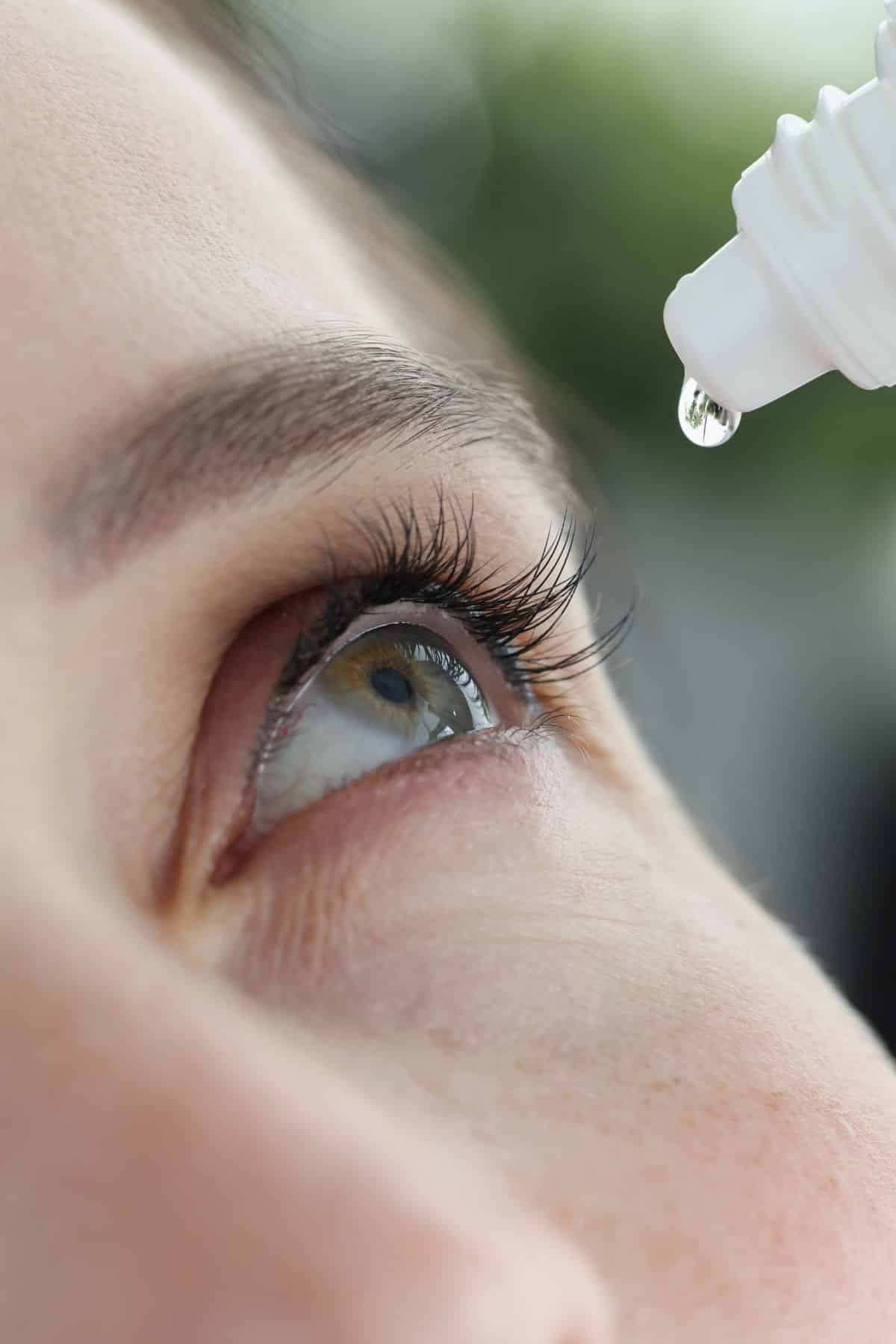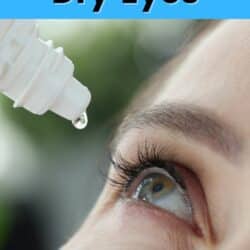14 Supplements, Nutrients & Herbs for Dry Eyes
No matter your gender or age, it’s always a good time to think about optimizing your eye health. In this post, I review the nutrients, supplements, and herbs that you can consider for dry eyes.

Eating a healthy diet is important for keeping our eyes healthy.
Our eyes are complex and need certain nutrients to work properly. If we don’t get the right nutrients, our eyes may have problems like dry eyes, macular degeneration, cataracts, and glaucoma.
Dry eyes happen when we don’t make enough tears, and this can be caused by not eating enough of the right foods. Foods that have omega-3 fatty acids, vitamin A, vitamin C, and vitamin E can help reduce inflammation and improve tear production to protect the eye’s surface.
By eating a healthy diet that has the right nutrients, we can take care of our eyes and lower the chance of having eye problems like dry eyes. It’s important to make sure we eat foods that are good for our eyes and to stay hydrated so our eyes can work properly.
Nutritional supplements can help bridge the gap between what we don’t get from our diets and what we need to support eye health and eye comfort.
Supplements for Dry Eyes
Let’s review the best nutrients and supplements that support eye health and can reduce the burning sensation associated with dry eyes.
As always, speak to your eye doctor or healthcare provider for more information about exactly how much you need of each nutrient and how you may be able to support your dry eye treatment.
1. Omega-3 fatty acids
Omega-3 essential fatty acids are “good” fats associated with many health benefits, particularly for the brain and heart. Less well-known, however, is their role in preventing the discomfort of dry eyes.
Omega-3s can improve your dry eye symptoms in two ways.
First, they help fight inflammation, often considered the root cause of many dry eye issues.
Secondly, they can help the meibomian glands along the edge of your eyelids produce more of a substance called meibum.
Meibum is made up of fatty acids and wax esters. It provides an oily layer in your tears and prevents them from evaporating too rapidly. This helps keep your eyes moisturized and comfortable.
According to experts, maintaining a healthy level of fatty acids ensures that your eyes’ meibum is of optimal consistency. Meibomian gland dysfunction is one of the main causes of dry eye.
There are several studies that demonstrate how effective omega-3 fatty acids are in soothing dry eyes.
This 2015 study, for example, found that omega-3s reduced the rate of tear evaporation in people with computer vision syndrome
Meanwhile, research in 2016 noted a significant improvement in symptoms after patients with rosacea and dry eyes took omega-3-based supplements for 6 months.
So what are the best ways to increase your levels of omega-3 fatty acids?
Consider eating more oily fish like sardines, mackerel, and salmon, along with fish oils like cod liver oil. The latter has the added benefit of being rich in vitamins A and D, other nutrients that are helpful in reducing eye inflammation.
Try making my recipes for Costco Stuffed Salmon, Salmon Salad with Mayo, Air Fryer Salmon, or Instant Pot Salmon and Rice.
Omega-3 dietary supplements are ideal for bridging the gap if your diet doesn’t provide enough fatty acids for your needs. It’s pretty easy to find omega-3 supplements these days that can help increase your intake of essential fatty acids. This supplement is also on my list of the best supplements for menopause joint pain.
2. Vitamin A
Vitamin A – also known as retinol – has a number of functions in the body but is particularly important for eye health.
It helps you to produce the tears you need to keep your eyes lubricated. It also helps keep the cornea (the eye’s protective outer layer) in good condition, providing an effective barrier between your eye and harmful bacteria.
Vitamin A deficiency – common in poorer parts of the world – can cause several eye issues, one of which is dry eyes.
Scientists have found that vitamin A supplementation can improve the quality of tears, thereby soothing symptoms.
Fortunately, there are plenty of foods rich in vitamin A that can help prevent the development of dry eyes.
These include:
- Apricots
- Beef liver
- Black-eyed peas
- Broccoli
- Carrots
- Dairy products
- Mango
- Pumpkins
- Red peppers
- Spinach
- Sweet potato
- Tomatoes
Your healthcare provider may recommend supplements if your diet doesn’t provide enough vitamin A for your needs.
It’s important to follow their advice regarding dosage, as too much vitamin A can cause harmful side effects, including nausea, skin irritation, and joint pain.
3. Vitamin D
Vitamin D is a fat-soluble vitamin that helps your body absorb calcium and phosphorus.
It is also very important for the health of your eyes. It is believed to prevent inflammation and it helps improve the composition of your tears.
If you don’t get enough vitamin D, the lack of proper lubrication can lead to the symptoms of dry eyes.
Your body produces vitamin D in your skin when you expose it to the sun. But during the winter months, or in parts of the world where the sun rarely shines, it can be hard to make enough.
Unfortunately, we can’t rely on our diets for vitamin D either. There are very few foods in which it is naturally present.
For this reason, vitamin D supplements are often recommended. And there is compelling evidence to show how effective they are!
One study – carried out in 2018 – found that oral vitamin D supplements improve tear quality, and research from 2019 discovered that vitamin D supplementation improves the effectiveness of lubricating eye drops.
As with vitamin A, it’s important to discuss supplementation with your healthcare provider, as too much vitamin D may be harmful.
On the other hand, correcting vitamin D deficiency may be one of the most important things you can do for your health, and your overall eye health.
4. Zinc
Zinc is an important nutrient. It supports the supply of vitamin A to the retina of your eye from your liver. It also promotes the health of your cell membranes and protein structure.
If the amount of vitamin A reaching your retina is compromised because your zinc levels are low, your retina can’t produce enough melanin.
This makes your eyes vulnerable to infection, potentially leading to the symptoms of dry eyes.
Your body doesn’t make zinc, so you need to obtain it from your diet.
Good sources include:
- Beef
- Eggs
- Fortified cereals
- Lentils
- Milk
- Nuts
- Oysters
- Peas
- Pork
- Salmon
- Yogurt
- Whole grains
If you struggle to consume enough of these foods, supplements may be recommended.
5. N-acetyl cysteine (NAC)
You may not be familiar with NAC, but this FDA-approved supplement has been used in medicine for several decades.
It comes from an amino acid called L-cysteine. Amino acids are often described as the building blocks of protein, so their role in the body is very important.
Optimal levels of NAC are particularly essential for your eye health.
This is because NAC helps support the function of the meibomian gland I mentioned earlier, helping maintain the oil level in tears and stopping them from evaporating too quickly.
It has also been demonstrated to have antioxidant and anti-inflammatory effects, making it useful for treating a range of eye conditions – including dry eyes.
Lacrimera eyedrops in particular have been shown to be safe and effective in treating moderate-to-severe dry eye disease.
In addition to supplements, there are some food sources of NAC you can enjoy to keep your levels topped up!
These include animal proteins like poultry, fish, and meat, and – to a lesser degree – eggs, along with dairy foods like cheese and yogurt.
6. Lutein and zeaxanthin
Lutein and zeaxanthin are carotenoids – the pigments in plants that give them their red or yellow colors.
They are antioxidants, meaning that there are all sorts of health benefits associated with consuming them.
But they are especially good for your eyes and are found concentrated in the macula, at the back of your eyeball.
Lutein and zeaxanthin help protect the cells in your eyes from damage caused by light and oxygen. They may also help prevent the development of age-related eye diseases, and reduce the inflammation associated with dry eyes.
The best food sources of these valuable nutrients are green, leafy vegetables like kale, spinach, collard greens, and broccoli. Your healthcare provider may suggest that you add a supplement if you struggle to consume enough.
7. Gamma-linolenic acid (GLA)
Earlier we looked at omega-3 fatty acids and their role in helping relieve dry eyes.
But there is another healthy fatty acid to consider, and that’s gamma-linolenic acid. This is an omega-6 fatty acid found in plant seed oils like evening primrose.
You can’t consume it at high levels through your diet, so the most common way to increase your GLA levels is via supplementation.
This is something worth discussing with your healthcare provider, as there is evidence that GLA has a positive effect on tear production.
Experts have also found that supplements containing both GLA and omega-3 fatty acids can be helpful for people with chronic dry eye.
In this study, 38 postmenopausal women with tear dysfunction were given a supplement containing GLA and omega-3 fatty acids for six months.
The women reported a marked improvement in eye irritation as a result, while the researchers noted improvements in the smoothness of the cornea.
8. Hyaluronic acid
Hyaluronic acid is a natural substance that we produce abundantly in our youth, but less so as we age.
Among its other roles, it makes up part of the vitreous humor – the transparent gel situated between the lens and the retina that gives our eyeball its shape and structure. It helps prevent inflammation – a contributing factor to dry eyes – and makes your tears more stable.
When your hyaluronic acid levels are low, your tears become very thin and don’t cover the surface of your eyes well, causing irritation.
After supplementation, however, tears become thicker and more viscous, coating the surface effectively and soothing your eyes.
9. Vitamin E
Vitamin E is important for eye health, although there is no evidence that it can specifically alleviate the symptoms of dry eyes.
Nevertheless, its importance in preventing cell damage in the eyes and its general immunity-boosting properties make it a useful nutrient to consider.
There are several good food sources of vitamin E to try in addition to supplementation.
These include:
- Almonds and hazelnuts
- Bell peppers
- Mackerel
- Mangos
- Peanut butter
- Spinach
- Sweet potato
- Sunflower oil and seeds
- Wheat germ oil
10. Coenzyme Q10
Coenzyme Q10 is an antioxidant that your body produces naturally and stores in your cells, particularly in the heart, liver, and lungs.
Commonly known as CoQ10, it is a fat-soluble compound that provides protection against free radicals – unstable molecules that can cause damage to the body.
There is evidence to suggest that it helps maintain eye health and experts have noted that using CoQ10 before and after eye surgery helps patients recover more quickly and reduces dry eye symptoms.
Sometimes, we don’t make quite as much CoQ10 as we need, and the amount we produce declines as we get older.
There are a few foods that supply this nutrient, including fatty fish, organ meats, nuts, and soybeans – but only in small amounts.
This means that CoQ10 supplements are sometimes necessary.
11. Chamomile
Whilst the benefits of using chamomile to soothe dry eyes have not been scientifically proven, there is plenty of anecdotal evidence to suggest it helps.
The best way to make the most of its anti-inflammatory properties is to use chamomile tea bags. Just steep 1 teabag in one cup of freshly boiled water, then pop the water in the fridge to chill.
You can then soak cotton pads in the tea and place them on your closed eyes for a minimum of 15 minutes. Some people find it helpful to press on them very gently during this time.
12. Fennel
Fennel seeds contain anti-inflammatory compounds. They have been used throughout history for a variety of medical purposes.
These include treating itchy, blurry eyes.
As with chamomile, you can use fennel seeds to make a tea that you can apply to your closed eyes using cotton pads.
13. Ginkgo biloba
Ginkgo biloba is one of the oldest living tree species in the world. Most ginkgo supplements are made with an extract prepared from its leaves.
It has been revered in Chinese medicine for many years but is now internationally popular, and recognized as being a rich source of antioxidants.
It is also taking its place in mainstream medicine, as it is believed to increase blood flow and prevent membrane damage caused by free radicals.
In this study, experts found that – when combined with hyaluronic acid – ginkgo biloba is effective at relieving dry eye symptoms in patients receiving cataract surgery.
14. Mucilage-containing herbs
Almost all plants produce a substance called mucilage, which is thick and gooey. How much mucilage plants produce depends on the polysaccharides they contain.
These polysaccharides swell in water and become slippery, producing a gel-like substance. This can be very soothing on irritated tissues and may help ease the discomfort associated with dry eyes.
Plants particularly high in mucilage include psyllium, aloe vera, fenugreek, licorice root, and okra.
Psyllium
Scientifically known as plantago ovata, psyllium has been used to make safe, natural eye drops that have been proven to help people with dry eyes.
Aloe vera
Studies have shown that filtered aloe vera extract can help reduce eye inflammation and dryness, although more research is needed to guarantee its safety.
For that reason, you should never put aloe vera directly into your eyes, and only use it to reduce irritation on the eyelids. Even then, be sure not to apply it too close to the edges.
Fenugreek
There has been promising research into the role of fenugreek in treating dry eye disease.
This article, for example, shows how a daily treatment with fenugreek safely and significantly reduced the symptoms of severe evaporative DTS (Severe Evaporative Dysfunctional Tear Syndrome) in postmenopausal women.
Licorice root
This contains a substance called glycyrrhizin, which scientists have discovered helps patients with moderate dry eye disease when administered in eyedrops.
Okra
If you’ve ever eaten okra, then you’re probably already familiar with its mucilaginous nature.
Experts have found that the mucilage in okra has anti-inflammatory properties that can play an important part in preventing dry eye symptoms.
FAQs
Because there is no one cause for dry eyes, there is no supplement better than another for dealing with the symptoms.
All the supplements listed here have different properties and are helpful in different ways. Some prevent inflammation, for example, and others increase the oil content in tears.
To determine which supplement will be most effective for you, discuss the cause of your dry eye symptoms with your healthcare provider.
While there is no cure for dry eye syndrome, one or more of the supplements described in this guide may help reduce your symptoms and make the condition far easier to live with.
But even as your symptoms ease, it’s important to continue to use any medications or treatments recommended by your healthcare provider in order to prevent your conditions from worsening.
Always seek professional advice before taking any supplement.
Some supplements can be harmful if you take too much, whereas others might react with medication that you’re already taking. This could produce unpleasant side effects, or even stop your medication from working properly.
Your healthcare provider will be familiar with your medical history and can advise you as to whether or not a particular supplement is safe for you.
No – it is important to follow the course of treatment prescribed by a medical professional.
Despite the fact that the supplements listed here are helpful in treating the symptoms of dry eye disease, none has been found to cure it.
More Helpful Articles About Supplements
Summary
The symptoms of dry eye syndrome can be annoying and uncomfortable. The good news, however, is that there are many nutrients – available through your diet or as supplements – that have been proven to soothe your eyes and keep your symptoms under control.
Don’t forget to join my newsletter list to get exclusive clean eating recipes and tips. The newsletter is 100% free with no spam; unsubscribe anytime.
About the Author: Carrie Forrest has a master’s degree in public health with a specialty in nutrition and is a certified holistic nutritionist. She is a top wellness and food blogger with over 5 million annual visitors to her site. Carrie has an incredible story of recovery from chronic illness and is passionate about helping other women transform their health. Send her a message through her contact form.
Note: this post is for informational purposes only and is not intended as medical advice. Please consult your healthcare provider for recommendations related to your individual situation.




















